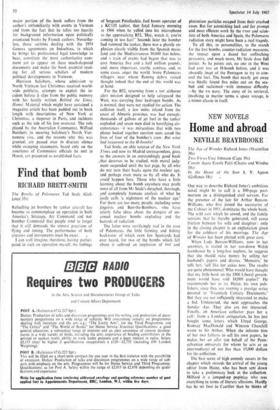Find that bomb
RICHARD BRETT-SMITH
Refuelling jet bombers by tanker aircraft has become so commonplace an operation in both America's Strategic Air Command and nAF Bomber Command that people tend to forget that it still demands the utmost precision of flying and timing. The performance of both aircrews and instruments must be exact.
I can well imagine, therefore, having partici- pated in such an operation myself, the feelings of Sergeant Potoliochio, fuel boom operator of a KC135 tanker, that fatal January morning in 1966 when he yelled into his microphone to the approaching B52, 'Hey, watch it, you're coming in too fast!' Seconds later the bomber had rammed the tanker, there was a ghastly ex- plosion clearly visible from the Spanish main- land and the Mediterranean 30,000 feet below, and a train of events had begun that was to cost America five and a half million pounds, and, more important, startle, confuse, and, in some cases, anger the world. Some Palomares villagers near whom flaming debris rained thought indeed that the end of this world was at hand.
For the B52, returning from a SAC airborne alert mission designed to help safeguard the West, was carrying four hydrogen bombs. As is normal, they were not readied for action. The collision itself, a few miles inland from the coast of Almeria province, was bad enough; thousands of gallons of jet fuel in the tanker exploded and seven men died in horrifying cir- cumstances—it was miraculous that with two planes locked together ejection seats saved the lives of four of the bomber's crew. But what had happened to the H-bombs?
Tad Szulc, an able veteran of the New York Times and now its Madrid correspondent, gives us the answers in an outstandingly good book ,that deserves to be studied, with moral judg- ment suspended until the last page, by all who do not turn their backs upon the nuclear age, and perhaps even more so by all who do. It could happen here. Those who have a little learning about the bomb anywhere may profit most of all from Mr Szulc's detached, thorough, and completely humane analysis of what he justly calls 'a nightmare of the nuclear age.' For there are too many people, including some jingoists and Ban-the-Bombers, who have utterly false ideas about the dangers of un- armed nuclear bombs exploding and the hazards of radiation.
The _latter were terrifyingly real in the case of Palomares, the little farming and fishing backwater of which even few Spaniards had ever heard, for two of the bombs which fell about it suffered an implosion of ma and plutonium particles escaped from their cracked cases. But for astonishing luck and for prompt and most efficient work by the USAF and scien- tists of both America and Spain, the Palomares radiation story might have been a real tragedy.
To all this, to personalities, to the search for the lost bombs, counter-radiation measures, the impact upon a dazed but unflinching peasantry, and much more, Mr Szulc does full justice. As he points out, no one in the West had ever lost an H-bomb before, and it was absurdly inept of the Pentagon to try to con- ceal the fact. The bomb that nearly got away was finally found five miles out on the sea bed and reclaimed—with immense difficulty —by the us navy. The story of its retrieval, involving in marine terms a space voyage, is - a minor classic in itself.






























 Previous page
Previous page